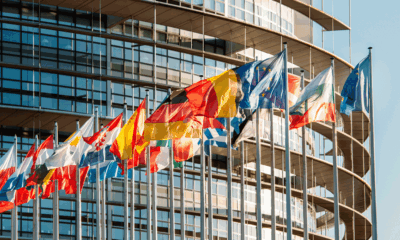Top Stories
Nigeria and South Africa Poised to Exit FATF Gray List in October

Nigeria and South Africa are on track to exit the Financial Action Task Force’s (FATF) “gray list” as early as October 24, 2024, according to a report by Bloomberg. This development marks a significant shift for the two largest economies in Africa, which have faced increased scrutiny over their measures to combat illicit financial flows since being placed on the list in February 2023.
Recent on-site assessments by the FATF indicated substantial progress in the action plans implemented by both countries, alongside Burkina Faso and Mozambique. Sources familiar with the matter revealed that all four nations are expected to be delisted during the FATF plenary session scheduled in Paris.
Impact on Investment and Economic Sentiment
The potential removal from the gray list is anticipated to enhance investor confidence in Nigeria and South Africa. Government spokesmen highlighted that this would reflect the effectiveness of ongoing reforms aimed at meeting international financial standards. A spokesman for Nigeria, Temitope Ajayi, expressed optimism, stating, “It would be a culmination of the remarkable work the government is doing in fulfilling our global obligations and making Nigeria more attractive to investors.”
According to Lauren van Biljon, a senior portfolio manager at Allspring Global Investments UK Ltd., the exit from the list “would certainly be good for sentiment.” While the immediate market impact may be modest, she noted that a short-term increase in asset prices could occur.
Countries included in the FATF gray list face heightened monitoring, which can deter foreign investment. A 2021 report from the International Monetary Fund (IMF) stated that nations on the gray list experienced a “large and statistically significant reduction in capital inflows.” Thus, both Nigeria and South Africa’s anticipated removal could serve as a crucial turning point for their economies.
Progress of Other Countries
Alongside Nigeria and South Africa, Mozambique and Burkina Faso have also made strides toward compliance with FATF standards. Mozambique has reportedly completed the necessary 26 actions required for delisting, with national coordinator Luís Abel Cezerilo expressing hope for a favorable outcome. He noted that the timing aligns with TotalEnergies SE’s expected resumption of its $20 billion natural gas export project.
Burkina Faso officials confirmed that all 37 measures for removal from the gray list have been implemented. However, responses from government representatives for Burkina Faso were not available for comment.
The FATF, under the leadership of Elisa de Anda Madrazo, has revised its gray-listing criteria to emphasize scrutiny on wealthier member nations, while placing less focus on jurisdictions classified with lower systemic risks. This shift aims to enhance compliance across the board.
As the FATF approaches its October plenary, both Nigeria and South Africa await confirmation of their status. South Africa’s National Treasury indicated it would comment after the official announcement, referencing a statement from July affirming that the country had substantially completed all 22 action items required for removal.
With the global financial community closely monitoring the FATF’s decisions, the outcomes for these four countries could have lasting implications for their economic futures and investment landscapes.
-

 Entertainment3 months ago
Entertainment3 months agoAnn Ming Reflects on ITV’s ‘I Fought the Law’ Drama
-

 Entertainment4 months ago
Entertainment4 months agoKate Garraway Sells £2 Million Home Amid Financial Struggles
-

 Health3 months ago
Health3 months agoKatie Price Faces New Health Concerns After Cancer Symptoms Resurface
-

 Entertainment3 months ago
Entertainment3 months agoCoronation Street’s Carl Webster Faces Trouble with New Affairs
-

 Entertainment3 months ago
Entertainment3 months agoWhere is Tinder Swindler Simon Leviev? Latest Updates Revealed
-

 World2 weeks ago
World2 weeks agoBailey Announces Heartbreaking Split from Rebecca After Reunion
-

 Entertainment2 weeks ago
Entertainment2 weeks agoCoronation Street Fans React as Todd Faces Heartbreaking Choice
-

 Entertainment4 months ago
Entertainment4 months agoMarkiplier Addresses AI Controversy During Livestream Response
-

 Science1 month ago
Science1 month agoBrian Cox Addresses Claims of Alien Probe in 3I/ATLAS Discovery
-

 Health4 months ago
Health4 months agoCarol Vorderman Reflects on Health Scare and Family Support
-

 Entertainment4 months ago
Entertainment4 months agoKim Cattrall Posts Cryptic Message After HBO’s Sequel Cancellation
-

 Entertainment3 months ago
Entertainment3 months agoOlivia Attwood Opens Up About Fallout with Former Best Friend





















